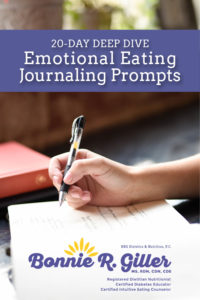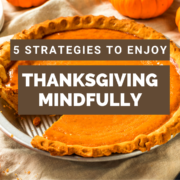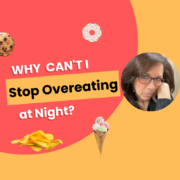3 Reasons to Start Journaling to Stop Emotional Eating
 Emotional eating is eating for reasons other than hunger, such as using food to cope, numb or deal with a difficult emotion, thought or feeling. It’s usually born out of an unmet need, whether physical- such as fatigue, or emotional – such as sadness or loneliness.
Emotional eating is eating for reasons other than hunger, such as using food to cope, numb or deal with a difficult emotion, thought or feeling. It’s usually born out of an unmet need, whether physical- such as fatigue, or emotional – such as sadness or loneliness.
For many, food is love, comfort, reward, or a reliable friend that won’t let you down.
Emotional eating is not a component of biological hunger, but instead is of emotional hunger. You’re longing for something, you have a void in your life, and you are filling it with food.
You may know exactly why you emotionally eat, or perhaps you don’t. Journaling can help you figure it out.
Journaling is verbalizing your feelings by writing them down and it’s very beneficial for your emotional well-being and to discover things that might have been buried for years.
3 Ways Journaling Can Help with Emotional Eating:
- Journaling allows you to express and release your feelings. By writing down your emotions, the intensity of those feelings goes from your body onto the paper and diminishes in time. You acknowledge them which enables you to release them.
- Journaling allows you to slow down and insert that pause, instead of impulsively reacting. This pause makes all the difference between whether your thought leads to impulsive eating or to reflection and consideration of maybe there’s a better path to take in that moment.
- Journaling replaces food. It can be used in the moment that are you feeling distressed and about to turn to food but instead, you pull out your pen and your note pad and you journal on the following prompt: “What am I feeling right now?” Put a name to your feeling and write it down. Just let your pen do the writing, don’t stop to edit, just write what you are feeling in that very moment. By writing down your feelings, you’re becoming more mindful and aware which is the first step in managing emotional eating.
When you turn to the journal during these difficult moments, you break the habit of turning to food automatically to deal with your strong emotions. Instead, you are replacing it with a healthier habit by asking yourself “okay, what do I need. I’ve identified my feelings, now what do I really need to feel better”.
The answer is usually not food. It may lie in connection, self-care, the need for support, to be nurtured. Journaling can help identify the real need.
 Grab your free copy of: 20 Day Deep Dive Emotional Eating Journaling Prompts
Grab your free copy of: 20 Day Deep Dive Emotional Eating Journaling Prompts











Leave a Reply
Want to join the discussion?Feel free to contribute!